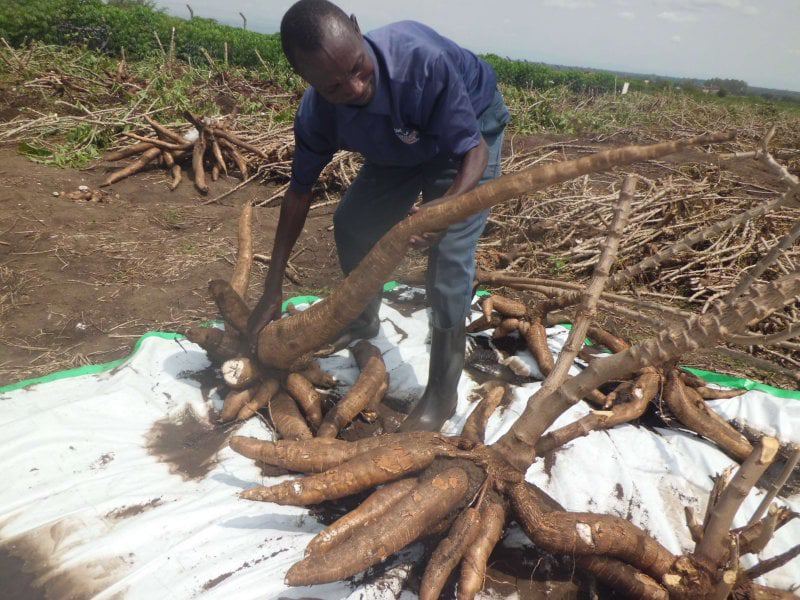CRISPR could yield cyanide-free cassava, helping protect health of a billion people
CRISPR could yield cyanide-free cassava, helping protect health of a billion people


“Roughly a billion people around the world rely on cassava as a source of calories, including around 40 percent of Africans ….” says Jessica Lyons, principal investigator of this cassava genome editing project at IGI.
Cassava is important, but it also comes with a built-in problem …. Cassava roots naturally produce the precursor of cyanide. Over time, consuming cyanide can have effects that range from subtle cognitive problems to konzo, a severe disease characterized by sudden and irreversible paralysis of the legs.
Proper processing can remove cyanide from cassava, but many people are eating insufficiently processed cassava. This is a problem particularly in parts of sub-Saharan Africa that have experienced drought, famine, and instability. The effects of the toxicity are worse in places where people don’t have easy access to protein in their diets, which helps detoxify cyanide and mitigates its effects.
To make cyanide-free cassava a reality, Lyons, [Michael Gomez, a postdoc in the Staskawicz Lab at IGI] and the team of researchers are using CRISPR genome editing to block the production of cyanide.
“We first applied CRISPR to engineer resistance to a problematic disease in East and Central Africa called cassava brown streak disease, in collaboration with the Danforth Plant Science Center in St. Louis, Missouri,” says Gomez. “We used CRISPR to target two specific genes, and showed a reduction in severity and incidence of symptoms.”
Read the original post

 | Videos | More... |

Video: Nuclear energy will destroy us? Global warming is an existential threat? Chemicals are massacring bees? Donate to the Green Industrial Complex!
 | Bees & Pollinators | More... |

GLP podcast: Science journalism is a mess. Here’s how to fix it

Mosquito massacre: Can we safely tackle malaria with a CRISPR gene drive?

Are we facing an ‘Insect Apocalypse’ caused by ‘intensive, industrial’ farming and agricultural chemicals? The media say yes; Science says ‘no’
 | Infographics | More... |

Infographic: Global regulatory and health research agencies on whether glyphosate causes cancer
 | GMO FAQs | More... |

Why is there controversy over GMO foods but not GMO drugs?

How are GMOs labeled around the world?

How does genetic engineering differ from conventional breeding?
 | GLP Profiles | More... |

Alex Jones: Right-wing conspiracy theorist stokes fear of GMOs, pesticides to sell ‘health supplements’




 California, Washington, Oregon forge immunization alliance to safeguard vaccine access against federal undermining
California, Washington, Oregon forge immunization alliance to safeguard vaccine access against federal undermining Trust issues: What happens when therapists use ChatGPT?
Trust issues: What happens when therapists use ChatGPT? Fighting deforestation with CO2: Biotechnology breakthrough creates sustainable palm oil alternative for cosmetics
Fighting deforestation with CO2: Biotechnology breakthrough creates sustainable palm oil alternative for cosmetics Viewpoint — Fact checking MAHA mythmakers: How wellness influencers and RFK, Jr. undermine American science and health
Viewpoint — Fact checking MAHA mythmakers: How wellness influencers and RFK, Jr. undermine American science and health 30-year-old tomato line shows genetic resistance to devastating virus
30-year-old tomato line shows genetic resistance to devastating virus The free-range chicken dilemma: Better for birds, but with substantial costs
The free-range chicken dilemma: Better for birds, but with substantial costs Viewpoint: Video — Big Solar is gobbling up productive agricultural land and hurting farmers yet providing little energy or sustainabilty gains
Viewpoint: Video — Big Solar is gobbling up productive agricultural land and hurting farmers yet providing little energy or sustainabilty gains ‘You have to treat the brain first’:Rethinking chronic pain with Sanjay Gupta
‘You have to treat the brain first’:Rethinking chronic pain with Sanjay Gupta
